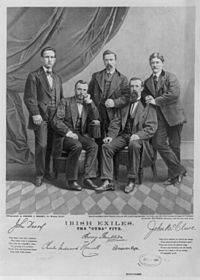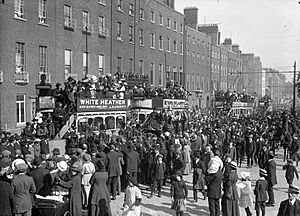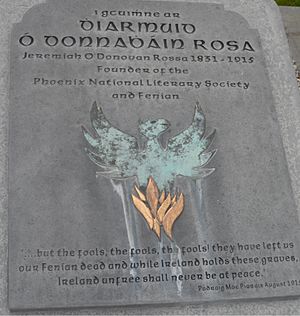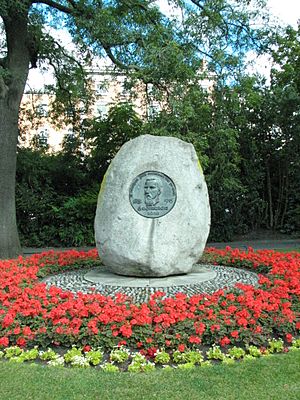Jeremiah O'Donovan Rossa facts for kids
Quick facts for kids
Jeremiah O'Donovan Rossa
|
|
|---|---|
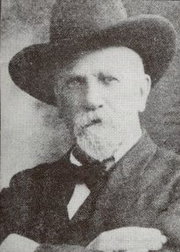 |
|
| Member of Parliament for Tipperary |
|
| In office November 1869 – February 1870 |
|
| Personal details | |
| Born |
Jeremiah Donovan
before 4 September 1831 Rosscarbery, County Cork, Ireland |
| Died | (aged 83) Staten Island, New York, U.S. |
| Spouse | Mary Jane Irwin |
| Military service | |
| Allegiance |
|
| Years of service | 1858–1915 |
| Battles/wars |
|
Jeremiah O'Donovan Rossa (in Irish: Diarmaid Ó Donnabháin Rosa; born September 4, 1831, died June 29, 1915) was an important Irish leader. He was part of a group called the Fenians and a member of the Irish Republican Brotherhood. These groups wanted Ireland to be free from British rule.
Born in Rosscarbery, County Cork, Ireland, during the terrible Great Irish Famine, O'Donovan Rossa spent his life working for an independent Ireland. He believed in using force to achieve this goal. After moving to the United States, he joined other Irish groups there. He was known for using dynamite in a campaign to challenge the British Empire, especially in London.
Contents
Jeremiah O'Donovan Rossa: A Fighter for Irish Freedom
Early Life in Ireland
Jeremiah O'Donovan Rossa was born Jeremiah Donovan in a small area called Reanascreena, near Rosscarbery, County Cork. His parents, Denis Donovan and Ellen Driscol, were farmers. He was baptized on September 4, 1831. He later took the surname "Rossa" from a place called Rossmore.
Rossa became a shopkeeper in Skibbereen. In 1856, he started a group called the Phoenix National and Literary Society. This group's main goal was to free Ireland using armed force. This society later joined with the Irish Republican Brotherhood (IRB), which was formed two years later in Dublin.
In December 1858, Rossa was arrested and put in jail without a trial until July 1859. In 1863, he became the business manager for a newspaper called The Irish People. This newspaper was shut down by the authorities in September 1865. Rossa was arrested again during this raid.
He was charged with "treason felony," which meant trying to overthrow the government. He was sentenced to prison for life because of his past actions. He served his time in several prisons in England, including Pentonville and Portland.
Rossa was a very strong-willed prisoner. He was often punished for breaking prison rules. For example, he was kept in chains for 35 days for throwing a chamber pot at a prison guard. He was also put in solitary confinement on a bread-and-water diet for refusing to take off his cap.
In 1869, while still in prison, he was chosen by voters to be a Member of Parliament for the Tipperary area. However, this election was declared invalid because he was a prisoner.
Life in the United States
In 1870, O'Donovan Rossa was released from prison as part of a special agreement called the Fenian Amnesty. He agreed not to return to Ireland. He then sailed to the United States on a ship called the SS Cuba with his friend John Devoy and three other exiles. They were known as "The Cuba Five".
O'Donovan Rossa settled in New York City. There, he joined groups like Clan na Gael and the Fenian Brotherhood. He also started his own newspaper, The United Irishman. In his newspaper, Rossa supported using dynamite bombs to fight for Ireland's freedom from British rule. He used his paper to raise money for this cause, calling it a "resources for civilisation fund."
Rossa helped organize the first bombings by Irish republicans in English cities. This was called the "dynamite campaign" and it happened throughout the 1880s. This made him very well-known, and disliked, in Britain. The British government tried to have him sent back to Britain, but they were not successful.
Rossa explained why he believed in his actions:
I have myself been called a madman, because I was acting in a way that was not pleasing to England. The longer I live, the more I come to believe that Irishmen will have to go a little mad my way before they go the right way to get any freedom for Ireland.
And why shouldn't an Irishman be mad; when he grows up face to face with the plunderers of his land and race, and sees them looking down upon him as if he were a mere thing of loathing and contempt! They strip him of all that belongs to him and made him a pauper and not only that, but they teach him to look upon the robbers as gentlemen, as beings entirely superior to him. They are called "the nobility," "the quality"; his people are called the "riffraff—the dregs of society."—Jeremiah O'Donovan Rossa
On February 2, 1885, Rossa was shot outside his office in New York City by an Englishwoman named Lucille Yseult Dudley. He was taken to the hospital with gunshot wounds. He said, "I've been wounded in the war." The British government said the woman was mentally unwell and not working for them. However, many people, including Rossa's supporters, found this hard to believe. It is more likely she was angry about the fund he created to buy weapons to fight the British.
Rossa was allowed to visit Ireland in 1894 and again in 1904. During his 1904 visit, he was honored as a "Freeman of the City of Cork."
Family Life
O'Donovan Rossa was married three times and had eighteen children. His first wife was Honora Eager, with whom he had four sons. She passed away in 1860. In 1861, he married Ellen Buckley, and they had one son. Ellen died in 1863. In 1864, he married Mary Jane (Molly) Irwin, and they had thirteen children together.
One of O'Donovan Rossa's great-great-grandsons is John Quill, a player for the US international rugby union team.
Death and Famous Funeral
In his later years, Rossa became very ill. He passed away in a hospital in Staten Island, New York, at the age of 83.
The new Irish republican movement in Ireland saw his death as a chance to inspire people. Tom Clarke, a leader, sent a message to John Devoy saying, "Send his body home at once."
Rossa's body was brought back to Ireland for burial. His funeral on August 1, 1915, at Glasnevin Cemetery was a huge event. It brought a lot of attention to the Irish Volunteers and the IRB. These groups were secretly planning a rebellion, which later became the Easter Rising.
The speech given at his graveside by Patrick Pearse is one of the most famous speeches in Irish history. It encouraged people to fight for Ireland's freedom. It ended with these powerful words:
They think that they have pacified Ireland. They think that they have purchased half of us and intimidated the other half. They think that they have foreseen everything, think that they have provided against everything; but, the fools, the fools, the fools! — They have left us our Fenian dead, and while Ireland holds these graves, Ireland unfree shall never be at peace.
His grave was restored in 1990 by the National Graves Association.
Rossa's Legacy and Memorials
Today, there are many memorials to O'Donovan Rossa. A monument stands in St. Stephen's Green in Dublin. A bridge over the River Liffey in Dublin is named after him. A street in Cork City and another in Thurles, County Tipperary, also bear his name. A park in Skibbereen is named after him, as is the local Gaelic football team.
There is also a memorial in his home village of Reenascreena, County Cork. The actual funeral casket that carried his body home is now on display there.
Several GAA teams across Ireland and even in New York are named after him. These include teams in Tyrone, Belfast, Magherafelt, Armagh, and Astoria, Queens.
Some of Jeremiah O'Donovan Rossa's descendants still live in Staten Island. They include the writer William Rossa Cole and former New York City Council member Jerome X. O'Donovan.
Rossa's Writings
Jeremiah O'Donovan Rossa wrote several books about his experiences and beliefs:
- O'Donovan Rossa's Prison Life : Six Years in Six English Prisons (1874)
- Rossa's Recollections. 1838 to 1898. (1898)
- Irish Rebels in English Prisons : A Record of Prison Life (1899)
See also
- Fenian Rising
- List of people on stamps of Ireland
- O'Donovan
Images for kids
 | Roy Wilkins |
 | John Lewis |
 | Linda Carol Brown |


